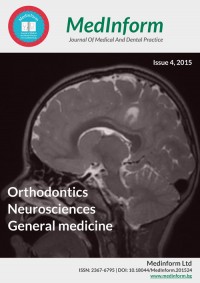Issue Four 2015
2015, Vol. 2, issue 4, (December)
Original Article
HBsAg-guided extension of Peg-IFN therapy in HBeAg-negative responders
Abstract:
Background: The ideal treatment end point in the management of patients with chronic HBV infection is loss of HBsAg. It could be achieved only in a few cases, especially in HBeAg – negative patients.The aim of the present study was to evaluate serum HBsAg levels in HBeAg-negative Bulgarian patients responding to the standard therapy with Peg-IFN as an attempt to navigate treatment duration according to the on-treatment HBsAg decline and appearance of anti-HBs.Methods: Twelve patients with HBeAg-negative chronic hepatitis B were studied. Subjects were treated with Peg-IFN alfa-2a. None of the studied patients fulfilled the “stopping rule” at the 3rd month of Peg- IFN therapy.Results: In 7/12 patients there was a sharp decline of the HBsAg levels with more than 90% reduction at treatment week-48 (and the levels were <100 IU/ml) and serum HBV DNA was undetectable. In 4 of these patients the therapy was extended for more than 48-weeks. HBsAg-loss was observed in two of them, which occurred at treatment week-48 and week-72, respectively. HBsAg-loss was associated with the development of anti-HBs (>100 IU/L) at treatment week-72 in these patients. In the 3rd patient an anti-HBs titer of 6-10 IU/L was detected at treatment week-72 and after that (96 week). In the 4th patient there was anti-HBs at week-108 (26 IU/L).Conclusion: Extension of Peg-IFN treatment is reasonable in patients who demonstrated a sharp HBsAg decline during the standard 48-week therapy. Probably, subjects with HBsAg level < 100 IU/ml will mostly gain from prolongation of Peg-IFN. In these cases we propose the term “extended rule”.
Authors:
Nina Nikolova; University Hospital “St. Ivan Rilski” – Sofia, Clinic of Gastroenterology;Deian Jelev; University Hospital “St. Ivan Rilski” – Sofia, Clinic of Gastroenterology;
Krassimir Antonov; University Hospital “St. Ivan Rilski” – Sofia, Clinic of Gastroenterology;
Lyudmila Mateva; University Hospital “St. Ivan Rilski” – Sofia, Clinic of Gastroenterology;
Zahariy Krastev; University Hospital “St. Ivan Rilski” – Sofia, Clinic of Gastroenterology;

